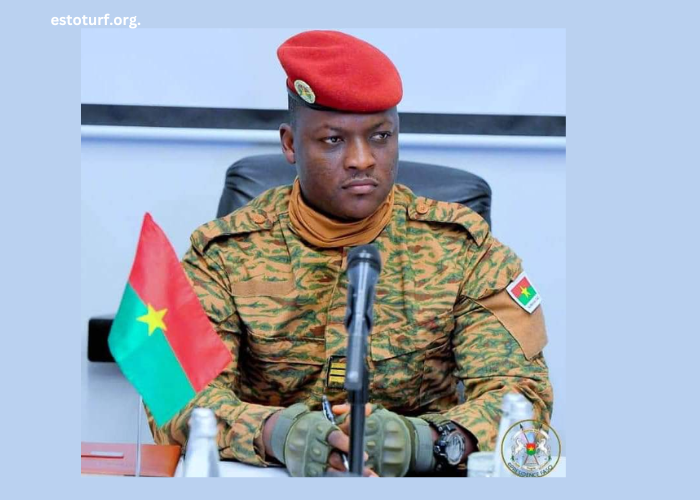Captain Ibrahim Traoré has emerged as a pivotal figure in Burkina Faso’s contemporary history, influencing both its military and political landscape. Known for his leadership during a period of significant turmoil, Traoré has played a crucial role in shaping the country’s trajectory. This article provides an in-depth exploration of his career, achievements, and the broader implications of his leadership for Burkina Faso.
Early Life and Military Background
Captain Ibrahim Traoré’s journey to becoming a key player in Burkina Faso’s political scene began with his early life and military career. Born in a country with a rich history of political and social challenges, Traoré’s background is marked by a deep commitment to his nation’s stability and progress. His military career started with rigorous training and a rapid ascent through the ranks, reflecting his dedication and capability.
As a young officer, Traoré demonstrated exceptional skills in leadership and strategy. His involvement in various military operations and peacekeeping missions provided him with valuable experience and a nuanced understanding of both regional and national security issues. This experience laid the groundwork for his later role as a leader during a critical period in Burkina Faso’s history.
The Rise to Prominence
Captain Traoré’s rise to prominence is closely linked to the political instability that has plagued Burkina Faso in recent years. The country, facing numerous challenges including insurgencies and governance issues, saw Traoré emerge as a significant figure during times of crisis. His leadership came to the forefront in a context where strong, decisive action was needed to address both security concerns and political instability.
Traoré’s ascent was marked by his involvement in key military interventions and strategic decisions. His ability to navigate complex political landscapes and respond effectively to emerging threats earned him recognition and respect both within the military and among the broader public. As a result, he became a symbol of hope for many Burkinabe citizens seeking stability and reform.
Key Military and Political Actions
Under Captain Traoré’s leadership, Burkina Faso experienced a series of notable military and political developments. His approach to governance and security was characterized by a combination of tactical precision and strategic vision. One of the key aspects of Traoré’s leadership was his focus on addressing the immediate security threats posed by insurgent groups operating within the country.
In addition to his military strategies, Traoré also played a crucial role in shaping the political landscape of Burkina Faso. His leadership was instrumental in implementing reforms aimed at improving governance and addressing the underlying issues that had contributed to the country’s instability. These reforms included efforts to strengthen institutions, enhance transparency, and promote national unity.
Traoré’s approach to governance was not without its challenges. Balancing military priorities with political reforms required careful management and a deep understanding of the complex dynamics at play. Despite these challenges, his leadership was marked by a commitment to creating a more stable and prosperous Burkina Faso.
Impact on Burkina Faso’s Society and Governance
The impact of Captain Ibrahim Traoré’s leadership on Burkina Faso’s society and governance is profound and multifaceted. His tenure has been characterized by significant efforts to address both immediate security concerns and long-term governance issues. These efforts have had a lasting impact on the country’s political and social landscape.
One of the key areas of impact has been in the realm of security. Traoré’s military strategies and interventions have played a crucial role in mitigating the threats posed by insurgent groups and restoring a degree of stability to affected regions. This focus on security has been essential for creating a more conducive environment for governance and development.
In addition to security, Traoré’s leadership has also had implications for governance and institutional reform. His efforts to promote transparency, accountability, and effective governance have contributed to the broader goal of strengthening Burkina Faso’s democratic institutions. These reforms are aimed at addressing some of the systemic issues that have historically undermined the country’s stability and development.
Challenges and Criticisms
Despite his achievements, Captain Ibrahim Traoré’s leadership has not been without challenges and criticisms. The complex political and security situation in Burkina Faso has posed significant obstacles, and not all aspects of his leadership have been universally acclaimed. Critics have pointed to various issues, including the difficulties of balancing military and political priorities and the challenges of implementing effective reforms in a turbulent environment.
Navigating these challenges requires a nuanced understanding of the country’s needs and a commitment to addressing both immediate and long-term issues. Traoré’s ability to manage these complexities has been a key factor in his leadership, but it has also been the subject of scrutiny and debate.
The Future of Burkina Faso Under Traoré’s Leadership
As Burkina Faso continues to navigate its path forward, the future under Captain Ibrahim Traoré’s leadership remains a topic of significant interest and debate. The ongoing efforts to address security challenges, implement reforms, and promote national unity will be crucial in determining the trajectory of the country.
Traoré’s leadership will likely continue to be a defining factor in Burkina Faso’s political and social landscape. His ability to respond effectively to emerging challenges, promote stability, and drive positive change will be critical in shaping the future of the nation. The legacy of his leadership will be measured by the extent to which it contributes to a more stable, prosperous, and unified Burkina Faso.
Conclusion
Captain Ibrahim Traoré’s role in Burkina Faso’s recent history is a testament to his leadership and commitment to his country. His impact on the military, political, and social dimensions of Burkina Faso reflects a complex and multifaceted approach to addressing the challenges faced by the nation. As Burkina Faso continues to evolve, Traoré’s leadership will remain a key factor in shaping its future, and his contributions will be remembered as a significant chapter in the country’s history.
